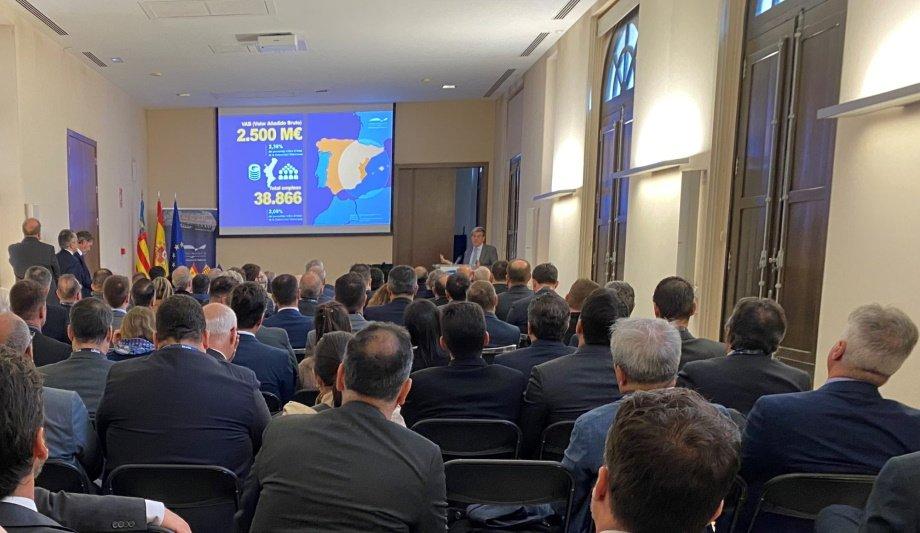A Brazilian business delegation has visited the Port of Valencia. The meeting brought Valencian and Brazilian companies and investors into contact with one another.
Aurelio Martínez, the President of the Port Authority of Valencia (APV), said “Brazil is the seventh country with the most commercial relations with Valenciaport. Businessmen must know that València is here, as a strategic hub or as an investment pole.”
Importance of Valenciaport in global trade
In the first nine months of the year, Valenciaport has handled a total of 1,783,827 tonnes of products to/from Brazil
In the first nine months of the year, Valenciaport has handled a total of 1,783,827 tonnes of products to/from Brazil. Sustainability, innovation and new business opportunities have focused the interest of a delegation of about a hundred businessmen and government representatives from Brazil (Brazil Export), in the working visit that they have made to the Port of Valencia.
The meeting has served to strengthen the commercial links between the logistics-port community of Valencia and the South American country of Brazil.
Brazil - One of the great powers of the 21st century
“Brazil is going to be one of the great powers of the 21st century. By countries, Brazil is the seventh with the most trade relations with Valenciaport: more than 200,000 containers come from Brazil every year, some of them bound for Spain and others are redistributed to the rest of the countries of the Mediterranean Sea. Businessmen must know that Valencia is at their service, as a strategic hub or as an investment pole,” says Aurelio Martínez, the President of the Port Authority of Valencia (APV).
The President of the Port Authority of Valencia explained to the Brazilian representatives that Valenciaport is making an effort in investments and future projects, in order to continue to be the great strategic reference of the European ports of the Mediterranean and a nexus of reference in the commercial relations between Brazil and Spain.
Port of Valencia - a great port in terms of traffic, efficiency
Aurelio Martínez adds, “We are a great port in terms of traffic, efficiency, stopover times and connectivity, and we also want to be a great port in terms of environmental sustainability and innovation. In addition, our strategic location and connections position us as a bridge between the American continent and Europe, North Africa and the Middle East.”
Aurelio Martínez made a presentation of the services and infrastructures of Valenciaport, the leading container port in Spain and the fourth in Europe, and a fundamental part of Spanish trade relations with foreign countries.
Valencian docks cater to global cargo
From the Valencian docks, Spanish goods are taken to any country in the world
From the Valencian docks, Spanish goods are taken to any country in the world, thanks to its connection with more than 1,000 ports and its commercial relations with 168 countries.
Moreover, the investments that are being made to improve intermodality and the use of the railway, or the commitment to open innovation to attract talent and look for technological solutions in the logistics and mobility area with initiatives, such as Opentop or ValenciaportPCS have also been presented.
Fabio Siccherino, the Chief Executive Officer (CEO) of DP World Santos, one of the shipping companies that took part in the visit, defended that stating “The Port Authority of Valencia is a reference in innovation, development and technology. For this reason, it is important to learn about good practices and what we can incorporate into our day-to-day operations.”
Training and technical assistance
Valenciaport is also collaborating with Brazil by promoting training. In fact, last 15th September, the Spanish Embassy in Brazil hosted the inauguration event of the 3rd edition of the Master in Logistics and Port Management session, taught by the Valenciaport Foundation in the Brazilian country, a training cycle that has already involved 90 managers of ports in this area.
The Valenciaport Foundation has also collaborated with the Ports of Paraná in their digital transformation processes and with the University of Santa Catarina within the Smart Port Logistics Chain project of the Federal Government of Brazil.
Valenciaport Foundation
A very important part of the Foundation’s activity takes place in Latin America"
Miguel Garín, the Director of International Development of the Valenciaport Foundation, confirms the importance of this type of visit, stating “A very important part of the Foundation’s activity takes place in Latin America. This visit by Presidents of Port Authorities and the Minister of Infrastructures himself, Marcelo Sampaio, is very important as an institution and also in terms of business and strategy. The businessmen will be able to learn from our knowledge and our way of proceeding.”
The Brazilian delegation, made up of around one hundred people and headed by its Minister of Infrastructures, Marcelo Sampaio, also visited the port facilities by ship, where they toured the container and ro-ro traffic terminals, getting to know first-hand the Port of Valencia’s operations.
A strategic partner
In the first nine months of the year, a total of 1,783,827 tonnes of products have been moved to/from Brazil and 128,411 containers. Of these, 233,152 tonnes of cargo are goods exported from the Valencian docks to the country, mainly chemical products, such as fruits, vegetables and pulses; cement and clinker; and construction materials.
From Brazil, 304,727 tonnes of cereals and flour; wood and cork; animal feed and fodder; other goods; chemical products; and paper and pulp have been imported. On the other hand, 1,245,948 tonnes are transit goods, such as other food products; chemicals; other goods; iron and steel products; and machinery and tools.
Relationship between Brazilian port of Santos and Valenciaport
The main Brazilian port that maintains relations with Valenciaport is that of the city of Santos, the main port in the country and in Latin America, with more than 600,000 tonnes managed with Valenciaport and close to 40,000 containers, followed by the Navegantes (Santa Catarina area) and Paranagua (Curitiba).
